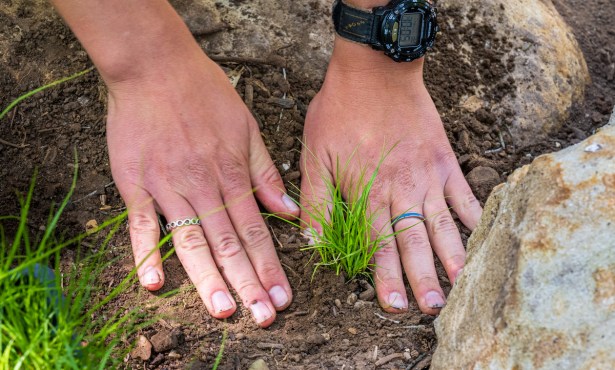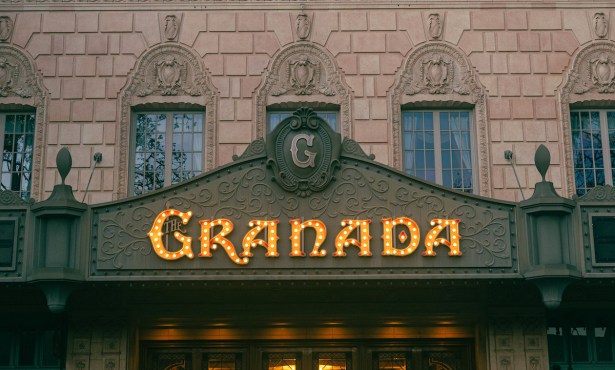Winning the Peace
Santa Barbara's Soldiers Versus Iraqi Hearts and Minds
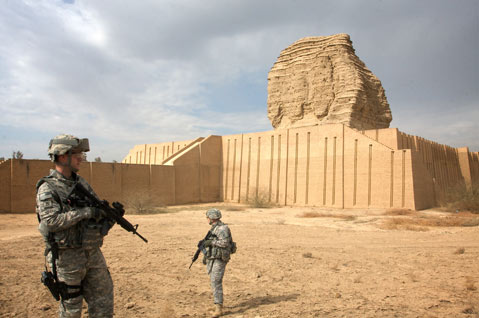
Before the sun rises each day over Baghdad, the predawn silence is broken by the muezzins’ calls to prayer, bellowing from electric loudspeakers throughout the city. For soldiers of the 425th Civil Affairs Battalion, the new day begins much like the last. Some of the reservists-most of whom have trained one weekend per month and two weeks every summer at the now closed Army Reserve Center on Las Positas Road and State Street-assemble outside of their wooden frame office building to go over the day’s mission. Others bustle about inside, performing the often tedious but always essential administrative tasks that keep the unit’s many programs in motion.
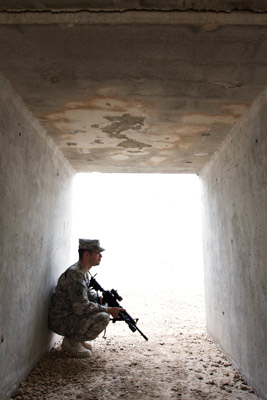
With light green, digitally patterned camouflage uniforms, the unit-whose home base was moved to Encino earlier this year-is a bright contrast to the drab grays and tans of Camp Liberty, which is located within the 65-square-mile Victory Base Complex in west Baghdad. In between mission briefings, phone calls to supply sergeants, and team meetings, jokes are told, stories about spouses are bandied about, and memories about fun times back home are shared, but the men and women serving in the unit exude an air of professionalism and dogged dedication to their lengthy overseas assignment.
This has been their life for most of the past year. When American combat troops pulled out of Iraqi cities at the end of June, Iraqis crowded onto the streets to celebrate what they called the end of American occupation. But the 425th Civil Affairs Battalion found that their mission would change very little until mid August, when they are scheduled to return to California and be replaced by another unit. The 240 or so soldiers from the 425th will continue going out into neighborhoods to help rebuild schools, train firefighters, and organize the city’s municipal infrastructures, among other tasks, mostly in Baghdad’s impoverished Mansour district.
The only thing that has changed much since the withdrawal is that the unit’s civil affairs teams no longer venture into the country’s teeming neighborhoods on their own-they now are escorted by Iraqi Army units. The 425th’s commander, Lieutenant Colonel Quincy Handy, is proud of the role his soldiers played in making this transition of power possible. “Overall,” he said, “they have done an exceptional job.”
To see for myself, I headed to Iraq this past February and spent five weeks embedded with the 425th. With few exceptions, I found that the unit’s soldiers range in age from early twenties to early fifties, and, aside from their close-cropped military haircuts and camo uniforms, they don’t look much different from the downtown office crowd. For many of them, that was exactly the life they left behind-some work in IT, some are office managers, other are cops and firefighters-and when deployed, many of them perform work that’s similar to what they do stateside.
Take, for instance, Staff Sergeant Jose Chavez, an Army brat who grew up on Santa Barbara’s Eastside. He was doing sales and marketing at Pro Band Sports Industries in Santa Barbara when he was shipped to Iraq, where he now does office work for an economic team in Baghdad’s International Zone. Then there’s Lieutenant Colonel Karl Berscheid, a civil rights attorney from Santa Maria who helped facilitate Baghdad’s provincial election in January as a part of the Baghdad Provincial Reconstruction Team. While most of the 425th is based at Camp Liberty, others-such as Sergeant Daleena Scott, once a student at Santa Barbara City College-find themselves in the relatively violent environs of Diyala, about 30 miles from the Iranian border. There, Scott and her comrades work closely with a Provincial Reconstruction Team.
Regardless of each individual job, the overall mission of the 425th Civil Affairs Battalion is to help Iraqis restore civil life to their war-torn country. And that’s a very different task than the military missions that have dominated the headlines since troops entered Iraq in March 2003. As Lieutenant Colonel Handy explained, “Kicking down doors and soliciting bribes isn’t the way to win hearts and minds.”
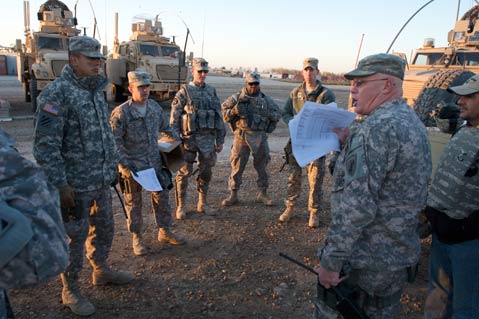
Another Day at the Office
Early each morning, soldiers from the 425th still begin their days exactly as they had when I visited six months ago, waking up in their trailers that sit in rows behind concrete blast walls. Some parts of the mission are different from the day before, but others, such as the escalation of force guidelines, stay the same. “Shout, show, shove, shoot, shoot, shoot,” says one of the soldiers, rehashing the guidelines to the group. “Shout at the threat, show your weapon and your intent to use it, shove the threat and maintain a 10-meter perimeter. Then, if you have to, fire a warning shot in a direction that won’t harm bystanders, shoot for the tires or engine block to disable the threat’s vehicle, and finally, shoot to kill.”
In a matter-of-fact-manner, soldiers on the three teams going out in the massive, dump-truckish armored vehicles called MRAPs (Mine Resistant Ambush Protected) take turns reading off mission parameters: what threats have been detected in the past 24 hours; which areas have come under attack; which route they will take, and what are the alternates in case of road closures; what they will do if they are ambushed; where the closest medical facilities are; and so on. For what’s essentially a drive to work, the preparation is exhausting, and soldiers often stay up late the night before to map out everything and get up early the next morning to prep the MRAPs.
Seeing these soldiers leave the base decked out in full battle regalia seems strange when they arrive at their destination-most often one of the schools, neighborhood council chambers, or municipal offices in the Mansour district. Once a situation is deemed safe on the streets of Baghdad, flak jackets are loosened and helmets doffed-with the exception of the sentries, who have to be ready for anything-and the busy work of the government aid agency begins.
Though 1,657 Iraqi civilians were killed in the first half of this year, the country certainly was much safer than it was in the first half of 2008, when 4,514 civilians were killed by insurgents. For soldiers who had been deployed to Iraq more than once, the present level of violence seems comparatively mild. Staff Sergeant John Falbo, a prison guard from upstate New York assigned to the 425th this deployment, has been to Iraq twice before. Last tour, a rocket attack killed six people at a bus stop, minutes after he’d wandered away to get some food. Along with other soldiers in the unit who had served multiple tours, Falbo was pleased to find the country much safer than before.
“I will certainly say it’s gotten better,” agreed Lieutenant Colonel Handy, who, in 2005, lost five soldiers in one day-his birthday. But the violence continues, as I witnessed one day while attending a conference with Handy and some other 425th soldiers. The event was held at the Al Rasheed Hotel in Baghdad’s Green Zone-considered one of the safer areas of the city-but twice that day, nearby explosions shook the walls and extinguished the lights in the conference hall. Both times, the speaker at the podium paused for a few moments as people fished flashlights out of their pockets and purses. Then it was business as usual, as if nothing had happened.
On this current tour, the 425th has tallied a few casualties, most recently in May when six civil affairs soldiers were injured in a blast in the southern Baghdad neighborhood of Al-Dura. With only a few more weeks of their deployment left, the soldiers of the 425th are determined to maintain their safety standards. And that’s a continual fight, for as Handy explained, “It’s still a battle out there.”
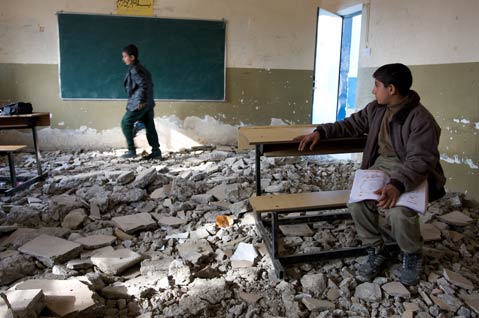
Handouts or Hands Up?
Considering that their office is a war zone, it’s amazing just how much they have accomplished. “When you think about a civil affairs team and what they can realistically get done in a day, how much more do you think they could get done in Fresno?” asked Lieutenant Colonel Simon Gardiner, the assistant chief of staff for Civil Military Operations for Multi-National Division-Baghdad, which oversees the 425th.
Many of the programs that the battalion runs are in the Mansour district, where trash-choked streets, thick wads of broken electrical wiring, and rubble-filled fields are common sights. The lively commercial areas are a lot less depressing than quiet residential streets, where people power every home appliance with a different strand of small-gauge wire, peering warily from their patios whenever the huge army trucks pull down wires, a fairly regular occurrence.
Although involved in a wide range of projects, the 425th’s work has two common themes: one, they’re small-scale and narrowly focused, and two, they’re designed to enable Iraq to stand on its own without a Saddam-esque dictatorship or Coalition support. “The handouts have to stop. We have to empower the Iraqis to do it themselves,” said Lieutenant Colonel Handy, explaining that the 425th has achieved greater success by functioning as a silent partner to institutions. “We need to build their capacity so that when we leave, they’ll be able to deal with their issues.”
Any program that focuses on job training or stimulating the economy is a no-brainer in this neighborhood. One of the more successful ones is a micro-grant project that gives as much as $2,500 to small shop owners for improvements that are intended to increase business. Since these entrepreneurs usually use locally sourced goods and services for their upgrades, it is hoped that the whole neighborhood will soon see a benefit.
One day in February, I accompanied soldiers from the 425th to a project site in Ghazalia, a neighborhood in Mansour that once was a hotbed of sectarian violence. Stray dogs and roving flocks of dirty gray sheep were grazing on smoldering piles of trash, but the civil affairs team seemed heartened by what they saw. Since last fall, grant recipients have begun to brighten up their storefronts with the occasional freshly painted wall or shiny new metal awning. Having overcome previous destruction, the colorful streets of Ghazalia’s commercial district were packed with shoppers.
Not every project has such simple, clear goals. Some former insurgents -who used to be combatants for Al Qaeda in Iraq-were coaxed away to become paid members of a Coalition-funded militia known as the Sons of Iraq who were supposed to maintain order in their districts. Now the Iraqi government wants to put more emphasis on improving the National Police force, and are transferring their funding there but know they cannot risk allowing these former militia members to become unemployed men. Paid job-training programs began, and at least four of them are now being run by 425th teams. The training costs around $7.5 million, and includes instructional facilities for electric generator mechanics and heavy equipment operators. “So far, this is a work in progress,” said Staff Sergeant Falbo. “It started off a little shaky, but it’s getting better. We’re staying in the oversight position and not telling them what to do-especially since we’re leaving soon.”
Unannounced inspection visits to the training sites, however, did not always appear very encouraging. Iraqis who were supposed to be in class could often be found lounging about smoking cigarettes, though they did try to appear busy whenever a U.S. convoy arrived. “You need strong supervisors to push these guys. Then they’ll work,” said Lieutenant Colonel Tom Downey, one of the team leaders, explaining that since many Iraqis have experienced long periods of unemployment, they are no longer used to 40-hour work weeks. One thing the American soldiers found very unexpected was the Iraqi custom of not working on paydays. “The cultural stuff is one of the most difficult things about working here,” said Captain Shawn Tobin, another team leader. “They just have a different way of doing things.”
One program that appears to be tremendously successful and is attracting highly motivated Iraqi participants operates at the Baghdad Fire Academy. There, soldiers from the 425th-such as Sergeant Major Garren Fulmer, a firefighter from Henderson, Nevada, and Sergeant Michael Kuca, who works for a U.S. Forest Service fire unit in Alaska-have trained more than 200 Iraqi firefighters in all facets of firefighting. Using a Jordanian instructional model and a state-of-the-art facility, the program’s goal is for the Iraqi graduates to take these skills and train the nearly 16,000 firefighters now employed by Iraq’s Civil Defense ministry throughout the country. The program is designed to strengthen the fire service, creating jobs and bolstering a much needed community asset. “We hope to do more training in the future, especially with our friends from the U.S. Army,” said Iraqi Air Force General Jafar Gatuf while watching a class of Iraqi Civil Defense and Air Force firefighters graduate. In fact, men have applied for the training in such record number that, even now, more courses are being opened to accommodate them all.
One happy surprise has been the modest success, or at least the survival , of what was at first considered a premature project by critics: the establishment of a tourism program. Although tourism looked like an unlikely route of economic recovery, Captain Cole Calloway, a business center general manager from Valencia, recently reported that the 425th team was much encouraged by work at the Baghdad Museum and at the ancient Aqar Quf ziggurat, both of which had been looted of most valuable artifacts when U.S. commanders relieved Iraqi authorities in 2003. Now, according to Calloway, the visitor facilities and administration buildings are scheduled to be rebuilt.
Another success has been the training of members of the Iraqi Army and National Police to do what the 425th does: civil military operations. “I’ve seen some very angry locals,” said Major Mark Berman, an American instructor in Taji, an Iraqi Army base a few miles north of Baghdad, “but we’re running practice drills training Iraqis to stay calm when dealing with the cast of characters they will likely encounter-insurgents, tribal leaders, and squatters, among others. Civil military operations are rarely as simple as, ‘Go out and take that hill.'”
One of the 425th’s most notable achievements was the nationwide provincial elections that occurred on January 31 of this year, only my second day in Iraq. Security, transparency, and honesty took top priority, but so did Iraqi autonomy, which meant that no foreign military personnel were permitted within 500 feet of polling sites. As a journalist, I was able to observe the election at the so-called 215 apartments, a walled neighborhood across the street from the fortress-like American Embassy Complex. With more loaded automatic weapons than I had ever seen in one place and stories of beheaded journos in my head, I felt my chest tighten against my flak vest with each breath.
But when I looked into the faces of the voters, my apprehension melted. People were ecstatic, and one man began tugging my sleeve, offering to translate and introduce me to his family members. His uncle, a muezzin in a nearby mosque who was dressed in a long brown dishdash, was elated. The last time he had voted was under Saddam, a time when all votes were cast for Saddam. “This election is like freedom. Every person can vote for who he likes,” said the uncle, showing off his purple thumb, which had been dipped in India ink to prevent a double vote. By day’s end, not only had 51 percent of Iraq’s population showed up to vote, but there had been no major instances of violence anywhere in the country.
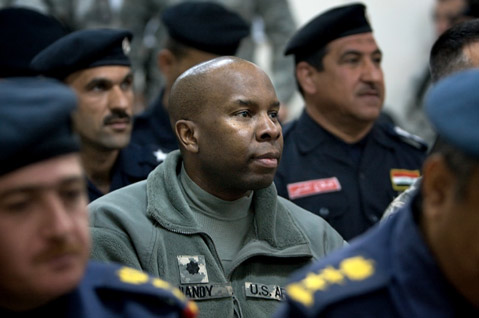
Eye on Iraqis
Ask 10 Iraqis for their opinions about the presence of foreign troops in their country, and you’ll likely get 10 different answers. One person may have had their home destroyed or a family member killed by a Coalition action. Another might feel safer with a strong non-Iraqi military presence. Looking through windshields into the faces of Baghdad’s traffic-bound freeway commuters from within a heavily armored MRAP, you get the idea that all of those folks would be happier if the lumbering, weapons-laden army trucks that always have the right of way were gone. One man scrunches his face as an army convoy drives by. A woman in a BMW, with three giggling little girls bouncing around in the backseat, wears a concerned expression as she tries to make a U-turn without getting in the way of the massive trucks.
As such, it’s easy to see what the celebrations of June 30 were about. As the head of the Mansour’s Ghazalia Neighborhood Council, Abbas Khadam has a pretty good handle on his neighbors’ needs and opinions. “All the people consider the American presence as a domination,” he said. “Iraq needs to develop its own police force and its own army. That is our challenge.”
But it will be a long time before the American presence in Iraq disappears. Throughout my trip, I was taken aback by the staggering amount of supplies being used by the U.S. military and its supporting contractors. While waiting in Kuwait for a flight to Baghdad, hundreds of diesel generators hummed as tons of one-time-use products were unloaded from tractor-trailers. At Camp Liberty, I passed a collection of bottled water pallets every day that was larger than several football fields. When I left Baghdad, my plane circled above vast expanses of discarded trucks, construction equipment, air conditioning units, and other scrapped supplies in junkyards that dotted the landscape from the Baghdad International Airport to Taji. Despite the planned troop withdrawals from the cities, construction while I was there continued at an unabated pace on U.S. installations around the capital, undoubtedly to accommodate the redistribution of troops.
Supplies aren’t the only thing being brought into the country-it’s people, too. I spoke to many of the thousands of foreign workers from developing nations who came to Iraq for jobs that pay them exponentially more than they could ever hope to make in Uganda, Peru, Sri Lanka, or the Philippines.
How long can we support such abundant supply lines that stretch over thousands of miles in this time of global recession, and what will happen to all of the security guards, cafeteria workers, and janitors who came from poverty-stricken nations all over the world-and whose families now depend upon the income-when the U.S. military calls it quits completely? The ardent hope of those who have worked in Iraq is that the gains that have been so assiduously achieved will remain when all the troops leave. Only time will tell. What is clear-from the English-language name tapes on Iraqi uniforms to the ubiquitous presence of U.S.-based companies like Kellogg, Brown & Root, and Triple Canopy-is that America has left an indelible mark on a once more singularly Arab society.
Regardless of how Iraqis feel about the U.S. presence in their country, there remains a pervasive attitude of distrust toward the Iraqi police force-in particular the National Police. While strengthening both the local and National Police forces has been a priority of Coalition commanders, weeding out corruption and sectarian militias has not been so easy. “I don’t want to be with terrorists and murderers,” said a teenaged security guard working in Ghazalia. He seemed to get along very well with American soldiers working in the area, who called him “Sergeant Mustafa.” The young man said that most people in his neighborhood don’t trust the Iraqi National Police, but that they also think U.S. soldiers are killers. “I know better,” he said, “I want to join the U.S. Army when I turn 18.”
Doing It Tolerably
A lot has changed since the United States overthrew Saddam Hussein in 2003, but some very basic facets of Iraq’s predominantly Arab society remain unchanged. Even where modern, industrial cities-such as Baghdad, population seven million-have grown up, traditional familial and tribal ties still remain, dictating how groups of people get along with one another. What an American or European might consider to be the best way to accomplish a task might not be supported by an Iraqi.
The British military adviser to Arab armies nearly 100 years ago, T.E. Lawrence-the famed Lawrence of Arabia-had advice for his commanders that applies to Coalition forces today, and really sums up the civil affairs modus operandi: “Do not try to do too much with your own hands,” he wrote in August 1917, before the modern borders of Iraq had even been established. “Better the Arabs do it tolerably than you do it perfectly.”
“Westerners tend to come blundering in here and think we have all the answers,” said Lieutenant Colonel Gardiner, who explained that putting an Iraqi face on Coalition-completed reconstruction work won’t have the lasting impact they’re looking for. “We’ve learned that that’s insufficient. Direct Iraqi involvement has to start from the very planning of any project. Otherwise, there’s no ownership and it won’t be built right.” As the civil affairs approach to waging war takes the lead role in Iraq, it seems that the wins finally are becoming more frequent than the losses in the battle to win the hearts and minds of the Iraqi people.
To see Ben Preston’s reporting from Iraq, go to independent.com/iraq.

